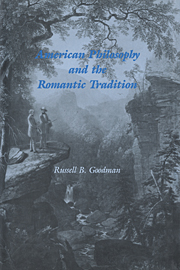3 - William James
Published online by Cambridge University Press: 07 October 2011
Summary
INTRODUCTION – JAMES AND WORDSWORTH
Unlike Emerson, William James was a professional philosopher. Nevertheless, he kept his distance from the profession. He maintained that “technical writing on philosophical subjects is certainly a crime against the human race!” And from his summer home in New Hampshire he wrote that he was “one unfit to be a philosopher because at bottom he hates philosophy, especially at the beginning of a vacation, with the fragrance of the spruces and sweet ferns all soaking him through with the conviction that it is better to be than to define your being.” (Of course this is a philosophical statement.)
James was always “a man speaking to men,” as Wordsworth wrote of the poet, and nowhere more so than in his philosophy. Indeed, it is almost as if Wordsworth were forecasting the character of William James when he described the poet as
“a man … endowed with more lively sensibility, more enthusiasm and tenderness, who has a greater knowledge of human nature, and a more comprehensive soul, than are supposed to be common among mankind; a man pleased with his own passions and volitions, and who rejoices more than other men in the spirit of life that is in him; delighting to contemplate similar volitions and passions as manifested in the goings-on of the Universe, and habitually impelled to create them where he does not find them.”
- Type
- Chapter
- Information
- American Philosophy and the Romantic Tradition , pp. 58 - 89Publisher: Cambridge University PressPrint publication year: 1991



